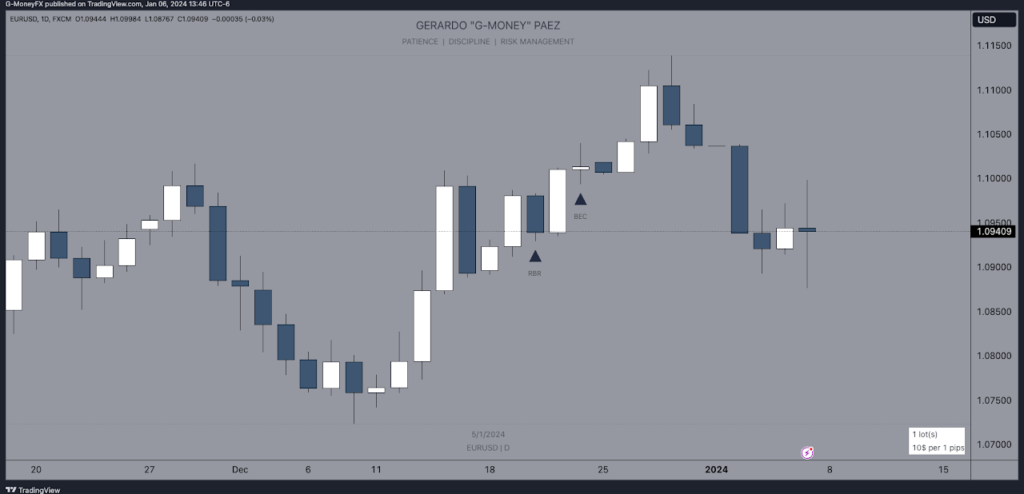
Introduction to the financial markets
Read this to create a better understanding of the financial markets
Financial markets are dynamic platforms where stocks, bonds, currencies, and commodities are exchanged. Essential to the global economy, they facilitate capital flow and offer diverse investment opportunities.
Mastering the skill of reading and interpreting price charts, like the one above, is crucial in these markets. This ability simplifies engaging with market movements and, with today’s technology, makes participation more accessible than ever. Online platforms have opened these markets to individuals, allowing easy entry into the world of financial trading.
Investing vs Trading
Discover the differences between the two and read my quick summary
Investing
Trading
How to start trading?
Step 1: Funding your account
Begin by depositing money into your chosen broker account. This is your trading capital
Step 2: Connect your platform
Link your broker account to a trading platform. This is where you’ll analyze the market and make trades
Step 3: Read and Speculate
Utilize the trading platform to observe market trends and form speculations. Analyze price charts to guide your trading decisions
Step 4: Trade
Buy Low. Sell High 📈
- Fund you account: Begin by depositing money into your chosen broker account. This is your trading capital
- Connect your Platform: Link your broker account to a trading platform. This is where you’ll analyze the market and make trades
- Read and Speculate: Utilize the trading platform to observe market trends and form speculations. Analyze price charts to guide your trading decisions
- Trade: Buy Low. Sell High 📈
Forex 101 – A Preview of my course on Ellev8
Contents:
Understanding Forex Trading
Forex, or foreign exchange, trading is centered around the buying and selling of currencies, capitalizing on fluctuations in exchange rates. It stands apart from other financial markets in several key ways:
24-Hour Market
Forex operates round the clock, offering continuous trading opportunities. This is possible due to the global nature of the market, with trading moving across major financial centers in different time zones
Accessibility
The Forex market is highly accessible to a wide range of traders. Whether you’re a beginner or a seasoned professional, Forex platforms are user-friendly and available across various devices, including mobile phones and desktops. This accessibility makes it easier for anyone to start trading.
Unmatched Liquidity*:
With a daily turnover of over $6 trillion, Forex is the most liquid market in the world. Such high liquidity means that large trades can be executed quickly and efficiently, with minimal impact on price — a significant advantage for traders looking to execute their strategies smoothly.
*Liquidity in the Forex market refers to the ease with which you can buy or sell currencies without causing significant changes in their prices. This is a key feature of Forex trading and is what makes it particularly appealing, especially for beginners. In essence, the high liquidity of the Forex market creates an environment where trading is accessible and more predictable, reducing some of the risks associated with price volatility. This makes Forex an attractive option for those starting in trading.
Market Participants: 👥💼🏦
In the Forex market, it’s essential for us, as retail traders, to understand the key participants. This knowledge helps us navigate the market effectively and align our strategies with prevailing trends:
Governments and Central Banks:
They play a major role in managing national currencies, interest rates, and monetary policies, often intervening in the Forex market to influence their currency’s value.
Commercial Banks and Financial Institutions:
Involved in Forex for both speculative purposes and client transactions, they form the interbank market, a significant hub of daily currency trading.
Corporations and Multinational Companies:
Engage in Forex for cross-border trade and to hedge against currency risk in international business dealings.
Investment Managers and Hedge Funds:
Including smaller banks and insurance companies, these institutions trade large volumes for investment or hedging purposes, impacting currency values.
Retail Forex Traders and Speculators (Us):
We, as individual traders or small groups, operate through brokers, speculating on currency price movements to generate profits.
Each of these participants plays a unique role, shaping the Forex market’s dynamics and influencing exchange rates. By understanding their motivations and actions, we, as retail traders, gain valuable insights into market trends, enabling us to make more informed decisions and align our trades with the larger market forces.
Price Speculation: 🔮💸📈
Forex trading is all about leveraging market tools to speculate on price movements. This speculative nature demands constant market analysis and informed decision-making, balanced with careful risk management and strategy. Success in Forex trading hinges on a deep understanding of the market, which is where proper education becomes vital.
Future Price Movements:
At its heart, Forex trading is about speculating on the future direction of currency prices. Traders use various analytical methods, including both technical and fundamental analysis, to predict whether a currency pair’s price will rise or fall.
Informed Speculation:
The goal is to make educated guesses, based on market analysis, economic indicators, and global events, about which direction currency prices are likely to move.
Brokerage Platforms:
Brokerage platforms are important when it comes to trading as they provide the following:
Access to Markets:
Brokers are essential in Forex, providing platforms for currency price speculation without physical ownership.
Ease of trading:
These platforms facilitate easy entry and exit, enabling quick response to market shifts and speculative strategies.
Leverage in Forex:
Broker-provided leverage can significantly enhance trading capacity. With careful lot size management, it shifts from a risk to a valuable tool in Forex.
Market Diversity in Forex:
Known for currency trading with various pair types, Forex also includes other assets like metals, indices, and cryptos, broadening trading prospects.
Like what you see?
Join Ellev8 and learn from me and many other like-minded educators in the Forex and Crypto space. My full course is available on Ellev8